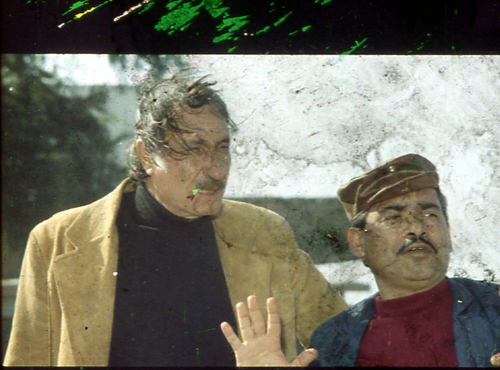
A roundtable discussion with Jennifer Bajorek, Sameer Farooq, John Greyson, Julie MacArthur, and Leila Pourtavaf
Wednesday, February 10, 7–9pm
e|gallery, CCT Building, UTM
FREE, all welcome
Presented in the context of the exhibition The Day After by Maryam Jafri on view at the Blackwood Gallery from January 13 - March 6, 2016.

Across the world, archives of photographs are disappearing, but does preservation pose its own problems? (Jennifer Bajorek, “Decolonizing the Archive,” Aperture 210)
[The] reconstruction of history is endlessly recombinant. (Scott MacKenzie, The Perils of Pedagogy: The Works of John Greyson)
Maryam Jafri’s exhibition The Day After questions the role of photography in the formation of historical and national narratives during the process of decolonization in Asia and Africa. It testifies to the complex role that tools for circulating and preserving heritage played in the identitarian and ideological construction of States after independence. Presented in conjunction with the exhibition, this roundtable discussion will explore the problems and potential of archival preservation, loss, disruption, destruction, and reconstruction. It brings together historians, philosophers, artists and curators whose various theoretical and creative practices highlight a systemic and perhaps irrevocable crisis in institutional and state-ordained archives. Following a series of presentations, we will engage in a discussion about possible alternatives to the institution of the archive and look to gestures, uses and networks at play that give rise to non-definitive narratives and tentative forms of suppositional knowledge.
For complimentary parking passes or shuttle bus tickets to UTM, please contact blackwood.gallery@utoronto.ca
JENNIFER BAJOREK is Assistant Professor of Comparative Literature at Hampshire College, USA, and a Research Associate in the Faculty of Art, Design, and Architecture of the University of Johannesburg, South Africa. She writes and teaches on literature, philosophical aesthetics, and photography. Her essays on historical and contemporary photography have been published in Aperture, Autograph ABP (Association of Black Photographers), and History of Photography. Her art writing has appeared in exhibition catalogues and online in Africultures, Africa is a Country, and the Galerie du Jeu de Paume blog. Her most recent book, How to Write a Visual History of Liberation: Photography and Decolonial Imagination in Africa (forthcoming, Duke University Press) explores the relationship between photography and political imagination in francophone West Africa in the years immediately leading up to and following independence. She is, together with Erin Haney, co-founder and co-director of Resolution, a non-profit organization dedicated to photography and photography archives in Africa.
The interdisciplinary practice of SAMEER FAROOQ aims to create community-based models of participation and knowledge production in order to re-imagine a material record of the present. He investigates tactics of representation and enlists the tools of installation, photography, documentary filmmaking, writing and the methods of anthropology to explore various forms of collecting, interpreting, and display. The result is often a collaborative work which counterbalances how dominant institutions speak about our lives: a counter-archive, new additions to a museum collection, or a buried history made visible. Farooq’s work has been exhibited internationally and he has been awarded several grants from the Canada Arts Council, Ontario Arts Council, Toronto Arts Council, and the Europe Media Fund, as well as the Chalmers Fellowship (OAC) and the President’s Scholarship at the Rhode Island School of Design. In the summer of 2015, Farooq and Mirjam Linschooten participated in an artist residency at the Blackwood Gallery which resulted in the exhibition The Figure in the Carpet.
JOHN GREYSON is a film/video artist whose works include Fig Trees, Murder in Passing, Zero Patience, Lilies and Covered. He teaches in York University's film department. His film 14.3 Seconds (2008) is made from shards of film left after the US bombing of the Iraqi film archive in 2003.
JULIE MACARTHUR is an Assistant Professor of African History at the University of Toronto. She holds a PhD in African history from the University of Cambridge and has taught African history and culture at universities across Canada, the UK and eastern Africa. Her first book manuscript on mapping, ethnogenesis and dissent in colonial Kenya is forthcoming in Spring 2016 with Ohio University Press. Currently, she is working on two new projects, one on the mapping of decolonization, sovereignty and border conflicts in eastern Africa and the other on the trial of the Mau Mau rebel Field Marshal Dedan Kimathi. She has also worked extensively in the field of African cinema, both as a curator and as an academic, exploring film as a central technology through which Africans compose, edit and consolidate their pasts, and as a means to express and engage with pressing social and political concerns in contemporary Africa. She has worked as a programming associate with the Toronto International Film Festival and Film Africa in London as well as serving as the Director of the Cambridge African Film Festival for several years. She is the curator of "We Must Invent": Film and the Unfinished Project of Decolonization, a film programme presented at the Blackwood Gallery in conjunction with Maryam Jafri’s exhibition The Day After.
LEILA POURTAVAF is a Toronto-based writer, independent curator and doctoral candidate in the Department of History at the University of Toronto. She was a founding member and coordinator of the projet Mobilivre–Bookmobile project and is the co-editor of a 2015 publication which chronicles the project’s five year history. She is also the editor of Féminismes Électriques (2012), a bilingual collection of essays which reflect on the last decade of feminist art production. In summer 2014, she curated Incident Light for the Blackwood Gallery, an exhibition featuring Middle Eastern and South Asian artists whose works focus on traces of gender and sexuality within various archives from the region.
The Blackwood Gallery is supported by the Canada Council for the Arts, the Ontario Arts Council, and the Department of Visual Studies, University of Toronto Mississauga.
![]()

